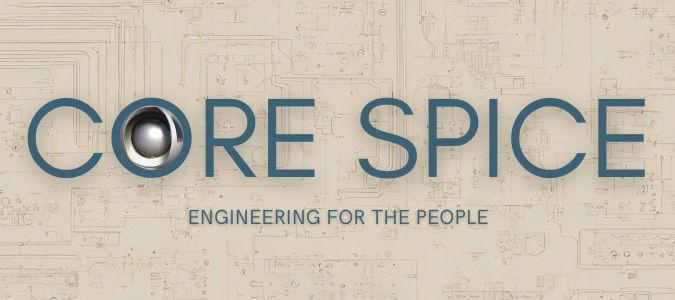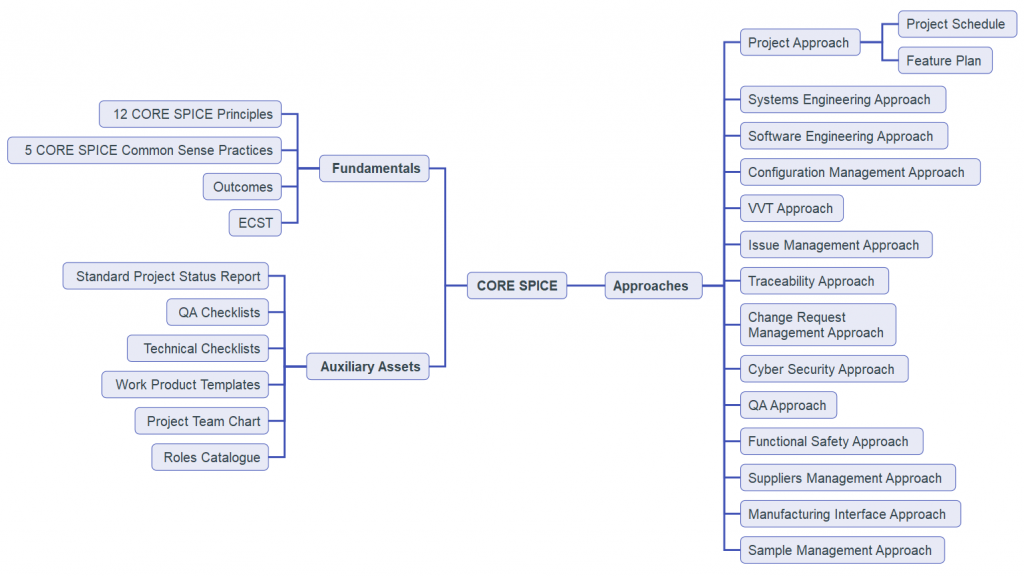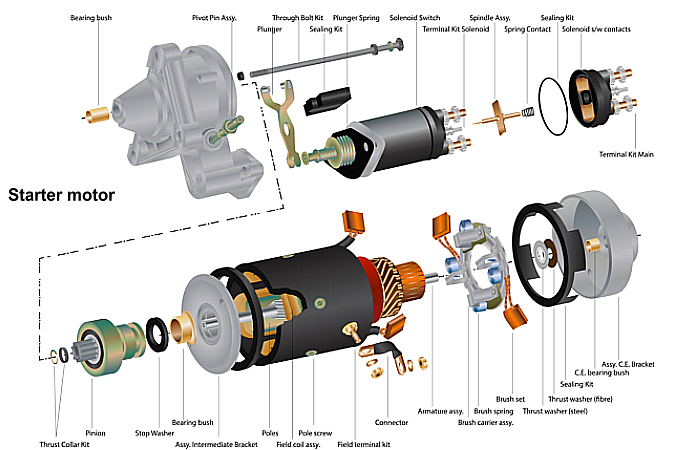
As seasoned project managers and process consultants, we understand the fast-paced nature of automotive development. Developed by experts with decades of experience in successful project management in the automotive industry and process optimization with Automotive SPICE, CORE SPICE is your gateway to compliance with ISO 26262 (functional safety) and ISO 21434 (cybersecurity) standards with greater efficiency.
Assessment models and standards such as Automotive SPICE, ISO 26262, and ISO 21434 aim to achieve maximum risk reduction throughout the product lifecycle. Automotive SPICE is the element that may be optimized, as standards like ISO 26262 are typically non-negotiable. The ASPICE assessment model comprises 16 reference processes, approximately 127 base practices, a similar number of generic practices, and intricate assessment criteria. Redundancy is intentionally built into many ASPICE practices to ensure thorough compliance with the assessment model. However, when implemented as a process, ASPICE can often lead to inefficient development workflows.
Therein lies the potential of CORE SPICE to resolve the efficiency dilemma.
In an era of fierce global competition within our industry, efficiency and speed have become crucial for manufacturers striving to maintain a competitive edge. CORE SPICE is designed to address these challenges through a practical, hands-on approach.
What is CORE SPICE?
CORE SPICE is a specialized framework designed to enhance the efficiency and effectiveness of development processes in the automotive industry. It is a streamlined progression to traditional approaches, such as ASPICE, focusing on rapid achievement of project maturity and compliance with industry standards such as ISO 26262. It is not a competition to ASPICE; instead, it is an intermediate process complexity level that may also be used to achieve ASPICE L2 compliance in a subsequent step if required.
CORE SPICE is derived from assessment models like ASPICE and CMMI and relates to PMBoK and agile practices. The basic CORE SPICE structure is shown in the following chart:

CORE SPICE comprises 14 project approaches defining how a system development project is structured. Some of these approaches are inspired by traditional IEEE standards, such as IEEE 828 for configuration management, which align with the CORE SPICE Configuration Management Approach. CORE SPICE offers a comprehensive, well-commented template for each approach. To become CORE SPICE compliant, all approaches must be completed, peer-reviewed, and fully understood by all project roles.
The fundamentals of CORE SPICE define the policies upon which CORE SPICE is built, represented in 12 CORE SPICE rules and 5 common sense practices, as well as the CORE SPICE outcomes and the ECST CORE SPICE philosophy.
12 Principles: CORE SPICE describes 12 Principles for successful automotive project management:
- Safety first.
- Integrity and ethics before profit.
- Quality culture instead of formal control.
- Approaches instead of process chains.
- Project over matrix.
- Cooperation instead of confrontation.
- Risk minimization instead of risk management.
- Ability to deliver instead of final delivery.
- Engineering skills before consensus.
- Responsibility instead of control.
- Merit instead of bureaucracy.
- Automated traceability (reduced traceability effort).
5 Common Sense Practices: The five Common Sense Practices in CORE SPICE apply to all approaches and auxiliary assets.
- Define: Define value-based goals.
- Assess: Do we have the resources?
- Plan: Do we have a viable schedule and resource plan?
- Track: What is the implementation status?
- Verify: Have we achieved what was initially defined as the outcome?
Outcomes: The CORE SPICE Outcomes define the result expectations that must be estimated, scheduled, and delivered throughout the project lifecycle.
ECST: The fundamental CORE SPICE philosophy is based on Effective Critical Systems Thinking, ECST (see LINK). This philosophy encourages the purposiveness of systems and software development that aims to ensure that development teams remain engaged and motivated even during challenging project phases.
Auxiliary Assets: The CORE SPICE Auxiliary Assets include the necessities required for a project organization to function efficiently, such as standard role descriptions, checklist templates, and a standard reference Team Chart.
The Key Advantages of CORE SPICE
Result-Oriented: It prioritizes project outcomes over detailed process definitions, aiming to deliver tangible results quickly and efficiently.
Simplified Processes: CORE SPICE reduces bureaucratic overhead, allowing teams to focus on development without unnecessary administrative burdens.
Quality and Integrity: The framework is governed by 12 CORE SPICE principles and 5 common sense practices, ensuring a culture of quality and integrity in every aspect of project management.
Cost-Effectiveness: CORE SPICE aims to be more cost-effective, potentially cutting project costs by at least 50% compared to achieving ASPICE Level 2.
Team Stability: A professional TCC (Team Capability Coach offers long-term support, which helps reduce staff turnover, fosters team growth, and ensures continuous project performance improvement.
ASPICE Compatibility: While CORE SPICE is a standalone framework, it is also a foundational stepping stone towards achieving higher ASPICE levels if the customer or your organization requires it.
CORE SPICE emphasizes a project-centric approach, with well-defined leadership roles and prioritization of safety.
Applying CORE SPICE
CORE SPICE can be used in the following contexts:
| Goal | Recommendation | Context |
| Regular product development | CORE SPICE | ISO-compliant development where the customer doesn’t demand ASPICE assessment. |
| Project reorganization | CORE SPICE | Re-enabling teams to deliver to the customer. |
| ASPICE pre-stage | CORE SPICE, then ASPICE | Startups and smaller organizations where ASPICE is optional |
| The customer requests ASPICE L3 | ASPICE | Conventional ASPICE Process Improvement |
| Increasing project efficiency and effectiveness | CORE SPICE | The goal is to improve team efficiency and team motivation, with customer projects potentially relevant in the future. |
The ultimate decision to use CORE SPICE must be aligned with the customer’s needs.
In Essence
CORE SPICE offers an innovative approach to automotive project management practices that ensures your competitive edge is maintained and sharpened. It is a practical project organization framework tailored for automotive systems developers who seek to streamline their development process, reduce time-to-market, and improve project quality, all while maintaining a competitive edge in the global market.
The goals of CORE SPICE include the following:
- Lower risk: Reduces the risk of non-delivery while ensuring the product’s safety and security within scope, effort, time, and quality to maximize customer satisfaction.
- Lower effort: Reduces the effort and time required to implement an ISO 26262-compliant project management system by at least 50% compared to the conventional process improvement from Level 0 to Level 2, as traditionally practiced in ASPICE or CMMI.
- Talent retention: Maximizes the talent retention rate of core team members.
CORE SPICE facilitates faster and earlier achievement of project goals, as it allows the team to work unhindered by reduced process bureaucracy and encourages earlier customer involvement. Prioritizing talent retention in systems and software engineering was a top priority in developing the CORE SPICE framework.
CORE SPICE can be used to implement a project management system for any project involved in developing automotive products, especially those focused on software and electronic systems. It is also suitable for similar industries with stringent safety and security requirements, such as life sciences and medical devices. CORE SPICE is ideal for OEMs and automotive supplier teams, enabling them to organize systems development work better
Please follow us on LinkedIn and Twitter for fresh updates on the CORE SPICE activities.
Let’s start a conversation on LinkedIn or X.com (formerly Twitter).







